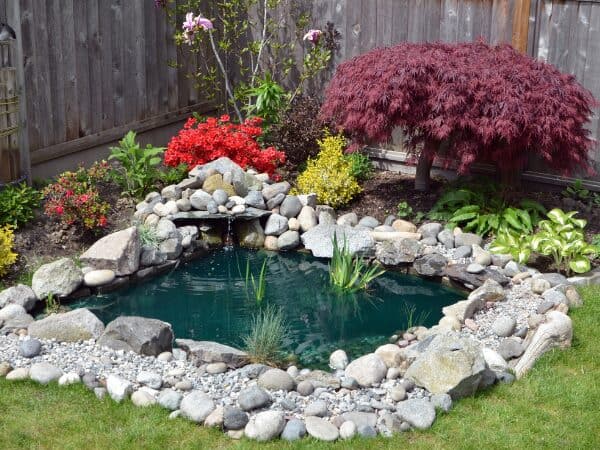
How to Care for a Small Backyard Pond
Having a small backyard pond creates a relaxing and intimate space for your family to enjoy the great outdoors. Whether it’s a peaceful retreat for quiet reflection or a vibrant ecosystem filled with plants and wildlife, a small pond can enhance your backyard, providing both beauty and tranquility. With the right care, your pond can become a stunning focal point, offering a calming ambiance and a place for relaxation and enjoyment. In this guide, we’ll walk you through how to properly care for a small backyard pond, ensuring it remains a healthy, thriving part of your garden.
Pond liner:
Once you have dug out the space for your pond, it is important to line it with a liner. Some good materials for pond liners are synthetic rubber and large sheets of plastic or fibreglass. Using a liner will prevent your pond from leaking. Your liner should get cleaned at least once a year to keep your pond in good shape. Once your liner is installed, cover it with a thick layer of sand to help keep it in place. Adding rocks and materials around the edge of your pond will also help keep the liner in place and prevent other water from entering the pond, so you can avoid contaminating your water.
Pump and filter:
It is very important to choose the right size pump for your pond. As a guideline, the pump should be circulating the entire volume of the pond every hour. Choose a location for your pump that ensures it won’t be blocked by debris or anything else that could stop the flow.
Your filter should also be sized to fit the volume of your pond. You should try to get a filter that is meant for a pond slightly bigger than yours to ensure the best filtration. There are different types of filters so choose the one that is best for your pond. Some are mechanical and filter out mostly debris while others use bacteria to break down waste in the water.
Fish:
Maintaining a healthy fish population is very important for your pond. Make sure you aren’t overpopulating your pond with fish. As a guideline, you should have 0.5”-3” of fish per 10 gallons of water. Having too many fish creates an imbalance in your pond. It is also important not to overfeed your fish as the uneaten food can cause algae blooms and unwanted waste in your pond. Choosing a food that floats on top and doesn’t sink to the bottom can also be better for cleaning out extra food.
Pond plants:
Ensure your pond is getting enough shade by covering half the pond or more with floating/emergent plants. This allows your pond to stay cool and stops algae blooms. They also provide protection for your fish. Add some oxygenating plants to ensure that your pond has enough oxygen. Make sure the plants are getting fertilizer as needed. For some great pond plants, check out our Benefits of Water Plants article.
Seasonal Care:
Your pond will need different types of care depending on the season. Here are some tips for taking care of your pond in every season.
Springtime:
- Clean out the pond bottom removing any debris and muck from the bottom and washing the liner
- Check for leaks or holes in the liner
- Check the pump and filter to make sure they are still in good condition
- Refill the pond and make sure it is clear of surface debris
- Add your fish and plants back into the pond once there is no chance of frost
- Cover most of your pond with floating plants for shade and add oxygenating plants to keep the water clear and the fish healthy
- Feed your fish using a high-carbohydrate food to get them active
Summertime:
- Make sure you are checking your water level and adding water in small amounts as needed
- Test water once a week using a testing kit. High levels of ammonia and other chemicals will kill your fish and plants
- Remove debris and dead plants and check pumps and filters to make sure they aren’t clogged
- The heat can reduce the oxygen in your pond. Adding a bubbler or fountain can help circulate the water and maintain proper oxygen levels.
- Check fish health
Fall:
- Keep the falling leaves out of your pond using a skimmer
- Don’t feed your fish as often, and stop feeding them once the water temperature is 50˚F
- Remove fish and plants that are non-hardy and bring them indoors if you are keeping them for next year
- Stop the pump and filter systems and disconnect them for the winter. Store them in a warm spot for the winter
- Drain the water from the pipes so they don’t get damaged in the winter
- You can also add Cold Water bacteria to keep your pond water clean and clear and reduce springtime maintenance
Winter:
- Maintain a hole with some form of slow water circulation in your pond to keep leftover fish alive, allow gas exchange (fish need oxygen to survive!) and keep your pond from freezing
- Do not feed your fish: their metabolism slows in cold water, and they don’t need to eat. Feeding them will kill them.
